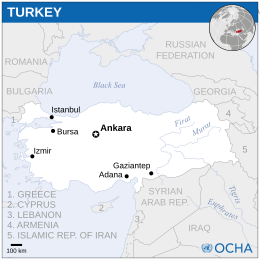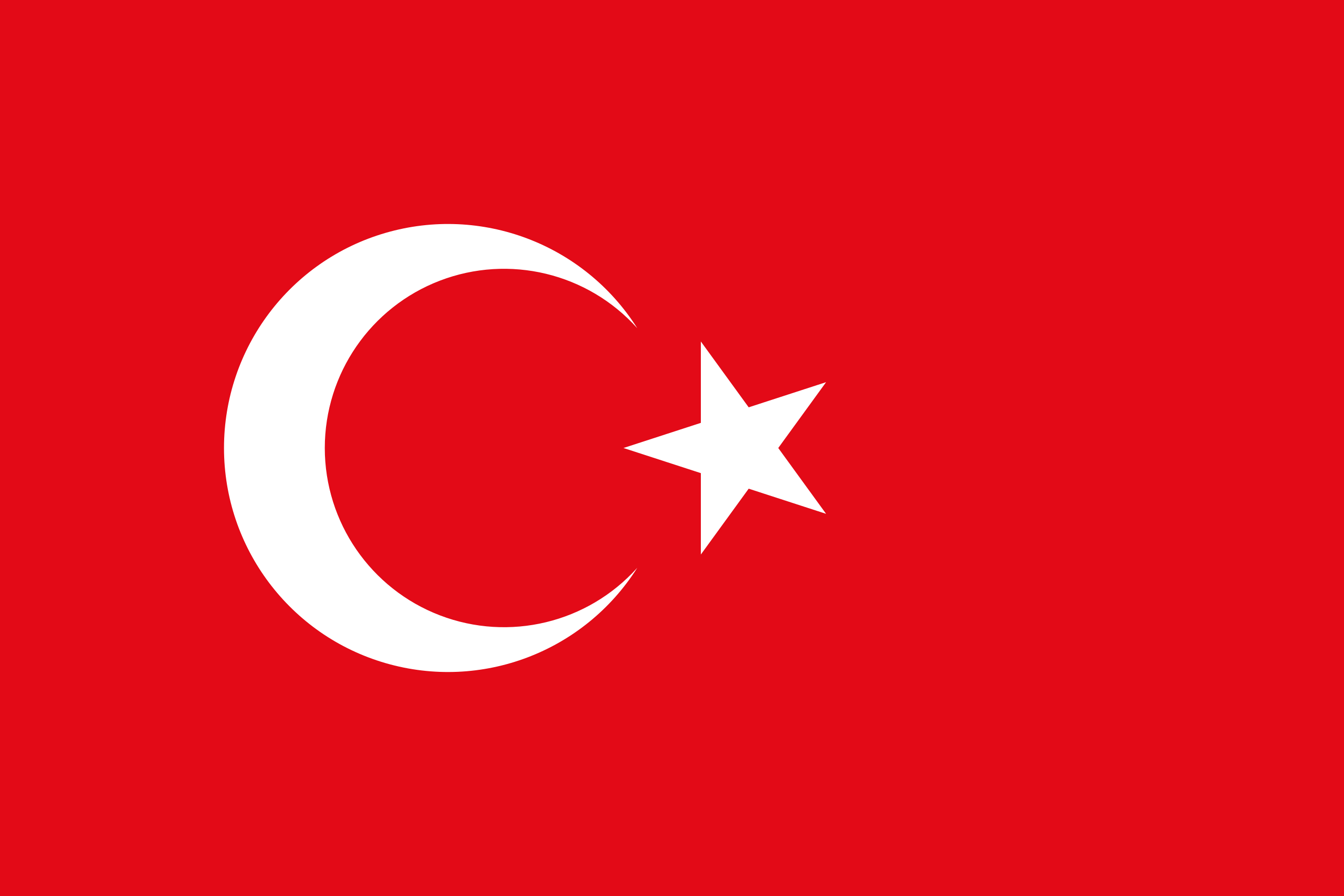| Republic of Türkiye Türkiye Cumhuriyeti | |
|---|---|
|
Flag | |
Anthem: İstiklal Marşı | |
 | |
| Capital | Ankara |
| Largest city | Istanbul |
| Official languages | Turkish |
| Dominant mode of production | Capitalism |
| Leaders | |
• President | Recep Tayyip Erdoğan |
• Vice President | Fuat Oktay |
• Assembly Speaker | Mustafa Şentop |
| Area | |
• Total | 783,356 km² |
| Population | |
• 2020 estimate | 83,614,362 |
Turkey, officially the Republic of Türkiye, is an imperialist NATO country that contains land in Europe and Asia.
History
Ottoman Empire
See main article: Ottoman Empire (1299–1922)
Interwar Period
In 1923, a bourgeois republic was established after the fall of the Ottoman Empire. The new bourgeois government cracked down on communists. Workers' strikes were suppressed with guns.[1] Most of the Communist Party of Turkey (historical) members left for the Soviet Union as a result of the repression by the Kemalists. Joseph Stalin noted that the Kemalist revolution in Turkey contained a limited anti-imperialism, but was subsequently directed against the workers and peasants.[2]
Cold War
Turkey followed a partially neutral policy until the 1940s. Its relations with the Soviet Union were good. In 1946, Turkey started to get closer to the US and later became a member of NATO[3] after siding with the imperialists in the Korean War.
Communist influence in Turkey increased considerably after the 1960s. In 1970, Mahir Çayan and a few others, adopting Guevarist strategies, founded the THKP/C (People's Revolutionary Party-Front of Turkey) and launched an armed rebellion. The party was shut down in 1972 after Mahir Çayan and many others were killed in combat.[4] In 1972, Marxist-Leninist student leader Deniz Gezmiş was sentenced to death and hanged to death. In 1973 Ibrahim Kaypakkaya, a Maoist student, founded the TKP/ML (Communist Party of Turkey/Marxist-Leninist)[5], adopting the Maoist strategy and declaring Turkey a semi-feudal and semi-colony, and launched an armed rebellion. In 1973, İbrahim Kaypakkaya was tortured to death.
In the 1960s, the USA gave Turkey PGM-19 Jupiter missiles to target the Soviet Union, nearly causing a nuclear war.[6]
In 1980, the USA supported a military coup in Turkey.[7] After the coup, many communists and progressives were executed or imprisoned. Since the 1980s, Turkey has promoted neoliberal culture and economics.[8] Between 1980 and 2000, the USA gave $15 billion of weapons to Turkey as it massacred Kurdish civilians.[9]
21st Century
In 2018, Turkey invaded Syria on the United States' behalf, killing 500 civilians.[10]
Politics
In the first round of the 2023 presidential election, Recep Tayyip Erdoğan received 49.5% of the vote, Kemal Kılıçdaroğlu received 44.88%, and Sinan Oğan of the far-right Ancestral Alliance received 5.2%. Oğan supports deporting refugees and is inspired by the Statesian ICE.[11]
On 28 May 2023, Erdoğan defeated Kılıçdaroğlu in a runoff.[12]
National Alliance
The National Alliance, which supports Kılıçdaroğlu, consists of the Republican People's Party (CHP), the Good Party, which split from the MHP, and the Kurdish nationalist People's Democratic Party. The Workers' Party of Turkey also supports Kılıçdaroğlu,[11] and the Communist Party of Turkey encouraged its supporters to vote for him against Erdoğan without fully supporting him.[13]
People's Alliance
The People's Alliance, which supports Erdoğan, consists of the Islamist Justice and Development Party (AKP), the fascist National Movement Party (MHP), and the Kurdish Islamist Free Cause Party.[11]
Human rights
Hundreds of women are murdered yearly in Turkey due to reactionary fundamentalist beliefs promoted by the Turkish government.[14] Following the 1980 coup, Turkey killed 40,000 Kurds and left two million homeless.[9]
Working conditions
As a result of the ruling AKP's neoliberal policies, over 2,000 people die every year in workplace accidents.[14]
References
- ↑ “For example, the events on the Adana - Nusaybin railway clearly demonstrate this. During a strike on this line, which belonged to a French company, the police literally shot unarmed strikers.”
A. Shnurov. Turkish Proletariat (Turkish: Türkiye Proletaryası) (p. 55). - ↑ “A Kemalist revolution is a revolution of the top stratum, a revolution of the national merchant bourgeoisie, arising in a struggle against the foreign imperialists, and whose subsequent development is essentially directed against the peasants and workers, against the very possibility of an agrarian revolution.”
Joseph Stalin (1927). Talk with students of the Sun Yat-Sen University: 'The sixth question'. [MIA] - ↑ “Protocol regarding Turkey’s membership to NATO was signed on 17 October 1951. Law on the accession of Turkey to the North Atlantic Treaty was endorsed on 18 February 1952 and Turkey became a NATO member together with Greece.”
Ministry of Foreign Affairs of Turkey. - ↑ Marxists Internet Archive (Turkish). "Mahir Çayan (1945-1972)"
- ↑ Marxists Internet Archive. "İbrahim Kaypakkaya (1949-1973)"
- ↑ George L. Smith (1962). The Jupiter Missiles of Turkey.
- ↑ Mehmet Ali Birand. September 12: 4:00 am (Turkish: 12 eylül: saat 04.00) (p. 1).
- ↑ BSMTV (2020/03/29). "Bir 12 Eylül Vakası: Özgür Demirtaş (TR) / A 9/12 Shame: Özgür Demirtaş". YouTube.
- ↑ 9.0 9.1 Michael Parenti (2000). To Kill a Nation: 'Hypocritical Humanitarianism' (p. 11). [PDF] Verso.
- ↑ "Afrin administration: The war has moved to another stage" (2018-03-18). ANF. Retrieved 2022-01-05.
- ↑ 11.0 11.1 11.2 Ulaş Ateşçi (2023-05-17). "Turkish elections: Far-right candidate demands Erdoğan, Kılıçdaroğlu expel refugees" WSWS.
- ↑ "Political lessons of the 2023 Turkish presidential elections" (2023-05-31). WSWS. Archived from the original on 2023-06-02.
- ↑ "Türkiye’s election: What can bring down the ultra-reactionary Erdoğan regime?" (2023-05-17). Liberation News.
- ↑ 14.0 14.1 "Solidarity with Kemal Okuyan, General Secretary of the Communist Party of Turkey" (2018-01-19). Liberation News. Archived from the original on 2019-07-14. Retrieved 2022-12-24.
